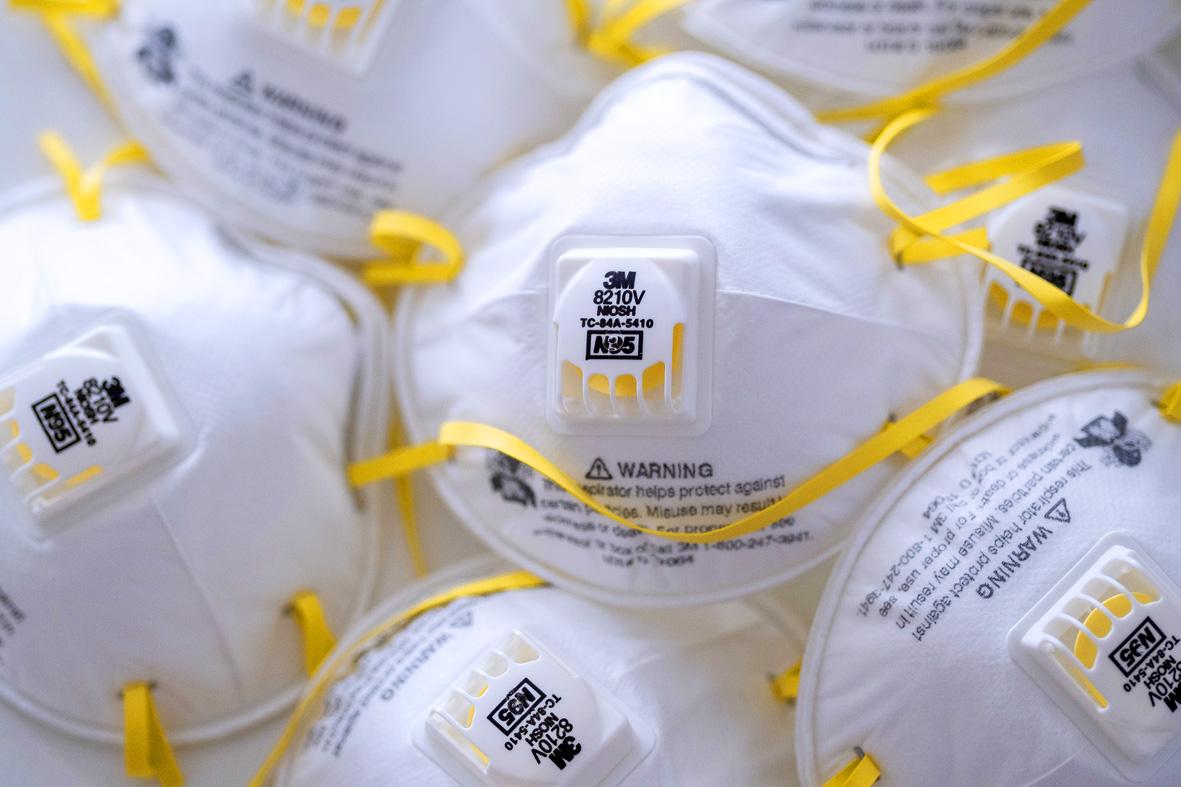The inventor of the key technology used in N95 respirator and medical masks is Taiwan-born scientist Peter Tsai (蔡秉燚), the Nonwoven Fabrics Industry Association said on Facebook on Monday.
Tsai was a professor in the University of Tennessee’s material sciences and engineering department for 35 years before retiring last year, and is a world-renowned expert in nonwoven fabrics.
He invented the electrostatic charging technology used to produce the filter media of masks, including medical and N95 masks, as well as heating, ventilating and air conditioning filters, and holds 12 US patents and 20 commercial license agreements for his inventions.

Photo: Bloomberg
While Tsai might not be a household name, he recently became familiar to Taiwanese due to an article he wrote answering common questions about sterilizing and reusing N95 masks, the association said.
The “N” in the respirator name means “not resistant to oil,” and “95” means the ability to remove at least 95 percent of submicron particles, such as influenza viruses, dust, pollen, haze and smoke, the association said.
N95 respirators are made of four plies of polypropylene media: an outer veil that can resist moisture, a double-ply filtration layer and an inner layer that is in contact with the skin, it said.
The outer and inner layers — usually made of spun-bond nonwoven and thermal-bond nonwoven fabrics — have low filtration efficiency and breathing resistance, and serve primarily to contain the middle layer, it said.
The middle layer, made of meltblown nonwoven fabrics, seals any gaps through which submicron particles might be able to enter and is key to the N95 respirator’s filtration efficiency, it said.
To manufacture meltblown nonwoven fabrics, two fundamental technologies are required: melt blowing and electrostatic charging, with the former being a nonwoven process that makes a fabric composed of microfibers; and the latter being the embedding of permanent charges in a fiber to form an electret that enhances filter efficiency by electrostatic attraction, the association said.
Tsai’s research in melt blowing and electrostatic charging greatly improved the filtration efficiency of nonwoven fabrics used in masks, allowing submicron particles to be captured and stopped from traveling through the masks, it said.
Tsai found that a charged medium has 10 times the filtration efficiency of an uncharged medium, meaning that one ply of charged fabric can have the same power as 10 plies of the same uncharged fabric, and better air permeability, too, it said.
According to the article, when high-quality masks are exposed to elevated temperatures, such as 70°C, for 30 minutes, the chances that a charge will decay are extremely low, so people can repeat this sterilizing method multiple times without a noticeable loss in filtration efficiency, as long as the masks are suspended without coming into contact with or being near a metal surface, Tsai said in an article for the University of Tennessee Research Foundation that was published on March 25.
As for treating masks with bleach, the article states that charges will not degrade as long as the ingredients do not include surfactants, while hot water generally does not affect the mask’s filtration performance, as long as the inner and outer veils of the mask are not made of paper-like tissue.

CHAOS: Iranians took to the streets playing celebratory music after reports of Khamenei’s death on Saturday, while mourners also gathered in Tehran yesterday Iranian Supreme Leader Ayatollah Ali Khamenei was killed in a major attack on Iran launched by Israel and the US, throwing the future of the Islamic republic into doubt and raising the risk of regional instability. Iranian state television and the state-run IRNA news agency announced the 86-year-old’s death early yesterday. US President Donald Trump said it gave Iranians their “greatest chance” to “take back” their country. The announcements came after a joint US and Israeli aerial bombardment that targeted Iranian military and governmental sites. Trump said the “heavy and pinpoint bombing” would continue through the week or as long

TRUST: The KMT said it respected the US’ timing and considerations, and hoped it would continue to honor its commitments to helping Taiwan bolster its defenses and deterrence US President Donald Trump is delaying a multibillion-dollar arms sale to Taiwan to ensure his visit to Beijing is successful, a New York Times report said. The weapons sales package has stalled in the US Department of State, the report said, citing US officials it did not identify. The White House has told agencies not to push forward ahead of Trump’s meeting with Chinese President Xi Jinping (習近平), it said. The two last month held a phone call to discuss trade and geopolitical flashpoints ahead of the summit. Xi raised the Taiwan issue and urged the US to handle arms sales to

State-run CPC Corp, Taiwan (CPC, 台灣中油) yesterday said that it had confirmed on Saturday night with its liquefied natural gas (LNG) and crude oil suppliers that shipments are proceeding as scheduled and that domestic supplies remain unaffected. The CPC yesterday announced the gasoline and diesel prices will rise by NT$0.2 and NT$0.4 per liter, respectively, starting Monday, citing Middle East tensions and blizzards in the eastern United States. CPC also iterated it has been reducing the proportion of crude oil imports from the Middle East and diversifying its supply sources in the past few years in response to geopolitical risks, expanding

Pro-democracy media tycoon Jimmy Lai’s (黎智英) fraud conviction and prison sentence were yesterday overturned by a Hong Kong court, in a surprise legal decision that comes soon after Lai was jailed for 20 years on a separate national security charge. Judges Jeremy Poon (潘兆初), Anthea Pang (彭寶琴) and Derek Pang (彭偉昌) said in the judgement that they allowed the appeal from Lai, and another defendant in the case, to proceed, as a lower court judge had “erred.” “The Court of Appeal gave them leave to appeal against their conviction, allowed their appeals, quashed the convictions and set aside the sentences,” the judges